Comprehensive Analysis of Work and Employment Relationship at Unilever
VerifiedAdded on 2022/12/27
|14
|3643
|43
Report
AI Summary
This report provides a comprehensive analysis of the work and employment relationship, focusing on Unilever. It begins by defining employee relations and explaining their value and importance, followed by an overview of fundamental employment laws, including the Equality Act 2010, Employment Rights Act 1996, and Health and Safety at Work Act 1974. The report then details the rights, duties, and obligations of both employers and employees within Unilever, along with various mechanisms for managing employment relationships, such as recognition, flexible hours, and bonus systems. A stakeholder analysis is conducted, examining how stakeholder engagement supports positive employment relationships. Finally, the report analyzes the impact of both positive and negative employee relations on different stakeholders, providing a well-rounded view of the subject.
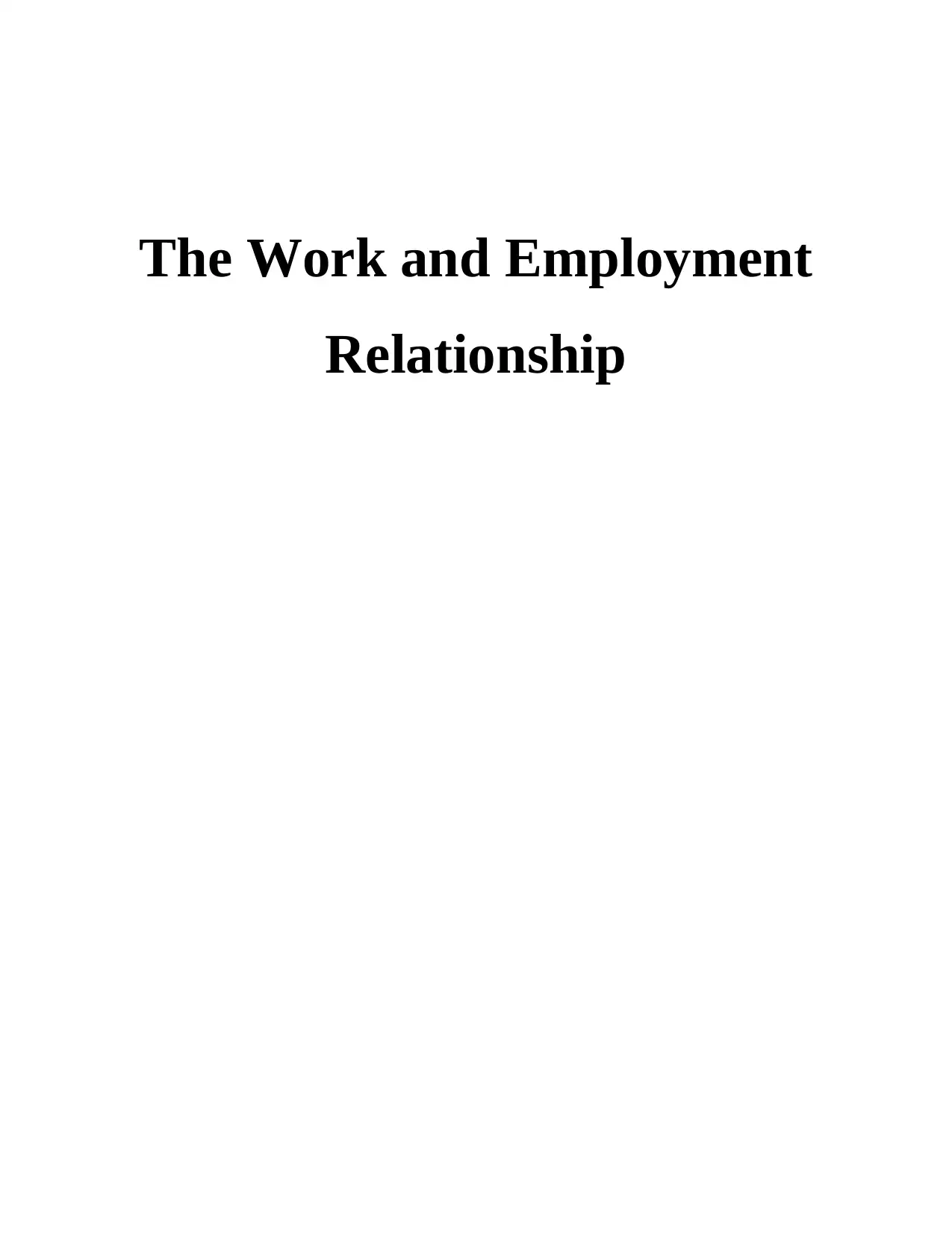
The Work and Employment
Relationship
Relationship
Paraphrase This Document
Need a fresh take? Get an instant paraphrase of this document with our AI Paraphraser
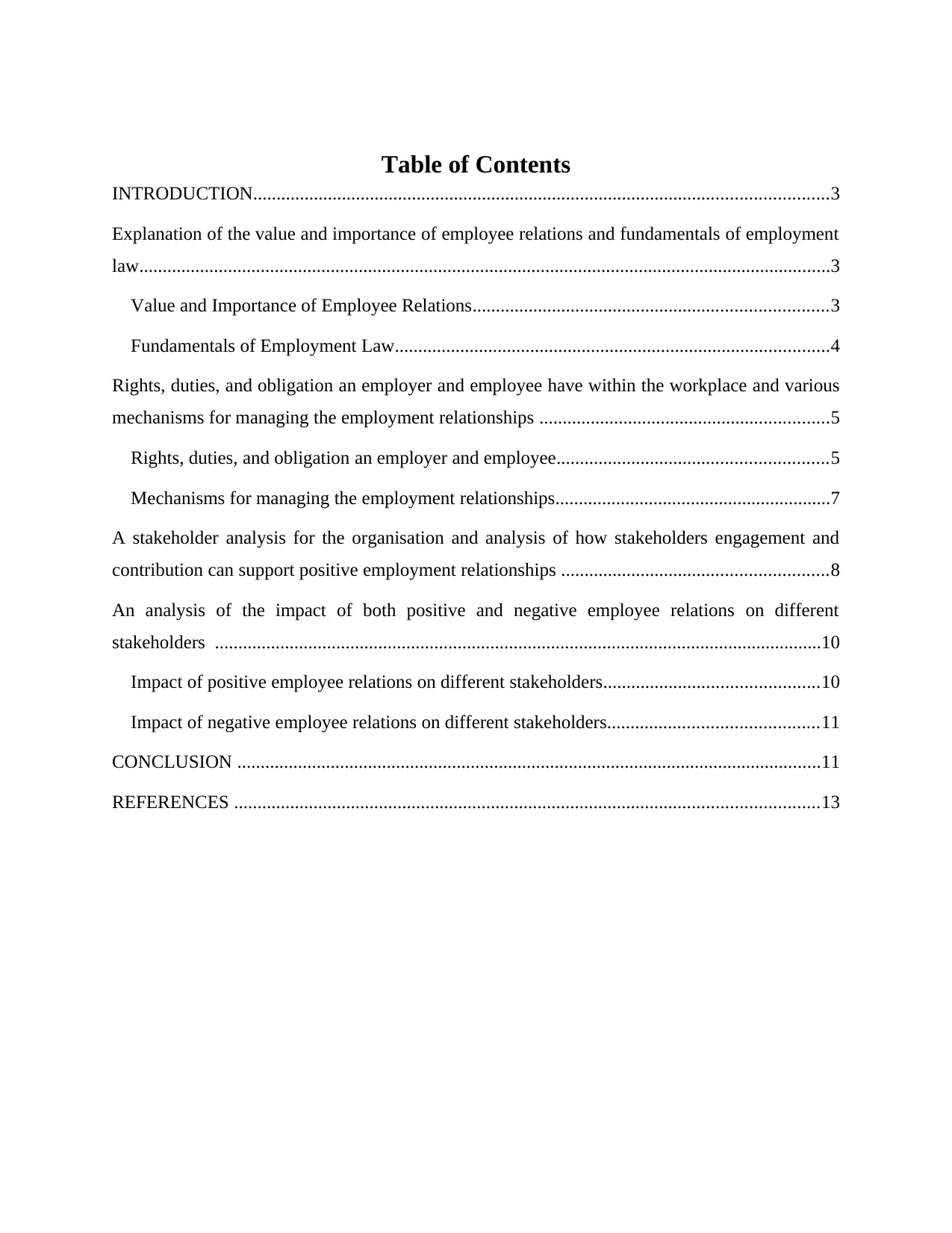
Table of Contents
INTRODUCTION...........................................................................................................................3
Explanation of the value and importance of employee relations and fundamentals of employment
law....................................................................................................................................................3
Value and Importance of Employee Relations............................................................................3
Fundamentals of Employment Law.............................................................................................4
Rights, duties, and obligation an employer and employee have within the workplace and various
mechanisms for managing the employment relationships ..............................................................5
Rights, duties, and obligation an employer and employee..........................................................5
Mechanisms for managing the employment relationships...........................................................7
A stakeholder analysis for the organisation and analysis of how stakeholders engagement and
contribution can support positive employment relationships .........................................................8
An analysis of the impact of both positive and negative employee relations on different
stakeholders ..................................................................................................................................10
Impact of positive employee relations on different stakeholders..............................................10
Impact of negative employee relations on different stakeholders.............................................11
CONCLUSION .............................................................................................................................11
REFERENCES .............................................................................................................................13
INTRODUCTION...........................................................................................................................3
Explanation of the value and importance of employee relations and fundamentals of employment
law....................................................................................................................................................3
Value and Importance of Employee Relations............................................................................3
Fundamentals of Employment Law.............................................................................................4
Rights, duties, and obligation an employer and employee have within the workplace and various
mechanisms for managing the employment relationships ..............................................................5
Rights, duties, and obligation an employer and employee..........................................................5
Mechanisms for managing the employment relationships...........................................................7
A stakeholder analysis for the organisation and analysis of how stakeholders engagement and
contribution can support positive employment relationships .........................................................8
An analysis of the impact of both positive and negative employee relations on different
stakeholders ..................................................................................................................................10
Impact of positive employee relations on different stakeholders..............................................10
Impact of negative employee relations on different stakeholders.............................................11
CONCLUSION .............................................................................................................................11
REFERENCES .............................................................................................................................13

INTRODUCTION
Employment relations refer to efforts of organisations efforts to create and maintain a
positive relationship with its employees. Employment laws have significant influence
employment relations within organisations. Positive employment relationships make it easy for
employee as well as employer to fulfil their roles and responsibilities effectively while working
in positive organisational environment. This report aims at discussing value and importance of
employee relations and fundamental laws. Later report will discuss rights, duties and obligation
of employer and employee and will also involve analysis of stakeholders and their contribution
and later will discuss about positive and negative impacts of employee relations on different
stakeholders. This discussion will contextualise Unilever, British multinational consumer goods
company. It was founded in 1929 and is headquartered at London, England and has its existence
in around 190 countries and employees around more than 155000 employees to carry out all
organisational activities.
Explanation of the value and importance of employee relations and
fundamentals of employment law
Employment relationship can be defined as legal relationship between employee and
employer and this relations exists when individual performs certain conditions in exchange of
remuneration (Employment Relationship, 2021).
This employment relationship is based on employment contract in employee and
employer and this contract creates legal relationship in employee and employer.
Value and Importance of Employee Relations
There are several reasons because of which employee relations are important within
Unilever and these reasons and value and importance of employee relations for Unilever are as
follows-
Fairness and Consistency- This is one of the very important value of employee relations
according to which fair employee relations ensure that employees and Unilever both are fair
towards each other (What Are Employee Relations and Why They Are Important, 2020). In addition
Employment relations refer to efforts of organisations efforts to create and maintain a
positive relationship with its employees. Employment laws have significant influence
employment relations within organisations. Positive employment relationships make it easy for
employee as well as employer to fulfil their roles and responsibilities effectively while working
in positive organisational environment. This report aims at discussing value and importance of
employee relations and fundamental laws. Later report will discuss rights, duties and obligation
of employer and employee and will also involve analysis of stakeholders and their contribution
and later will discuss about positive and negative impacts of employee relations on different
stakeholders. This discussion will contextualise Unilever, British multinational consumer goods
company. It was founded in 1929 and is headquartered at London, England and has its existence
in around 190 countries and employees around more than 155000 employees to carry out all
organisational activities.
Explanation of the value and importance of employee relations and
fundamentals of employment law
Employment relationship can be defined as legal relationship between employee and
employer and this relations exists when individual performs certain conditions in exchange of
remuneration (Employment Relationship, 2021).
This employment relationship is based on employment contract in employee and
employer and this contract creates legal relationship in employee and employer.
Value and Importance of Employee Relations
There are several reasons because of which employee relations are important within
Unilever and these reasons and value and importance of employee relations for Unilever are as
follows-
Fairness and Consistency- This is one of the very important value of employee relations
according to which fair employee relations ensure that employees and Unilever both are fair
towards each other (What Are Employee Relations and Why They Are Important, 2020). In addition
⊘ This is a preview!⊘
Do you want full access?
Subscribe today to unlock all pages.

Trusted by 1+ million students worldwide
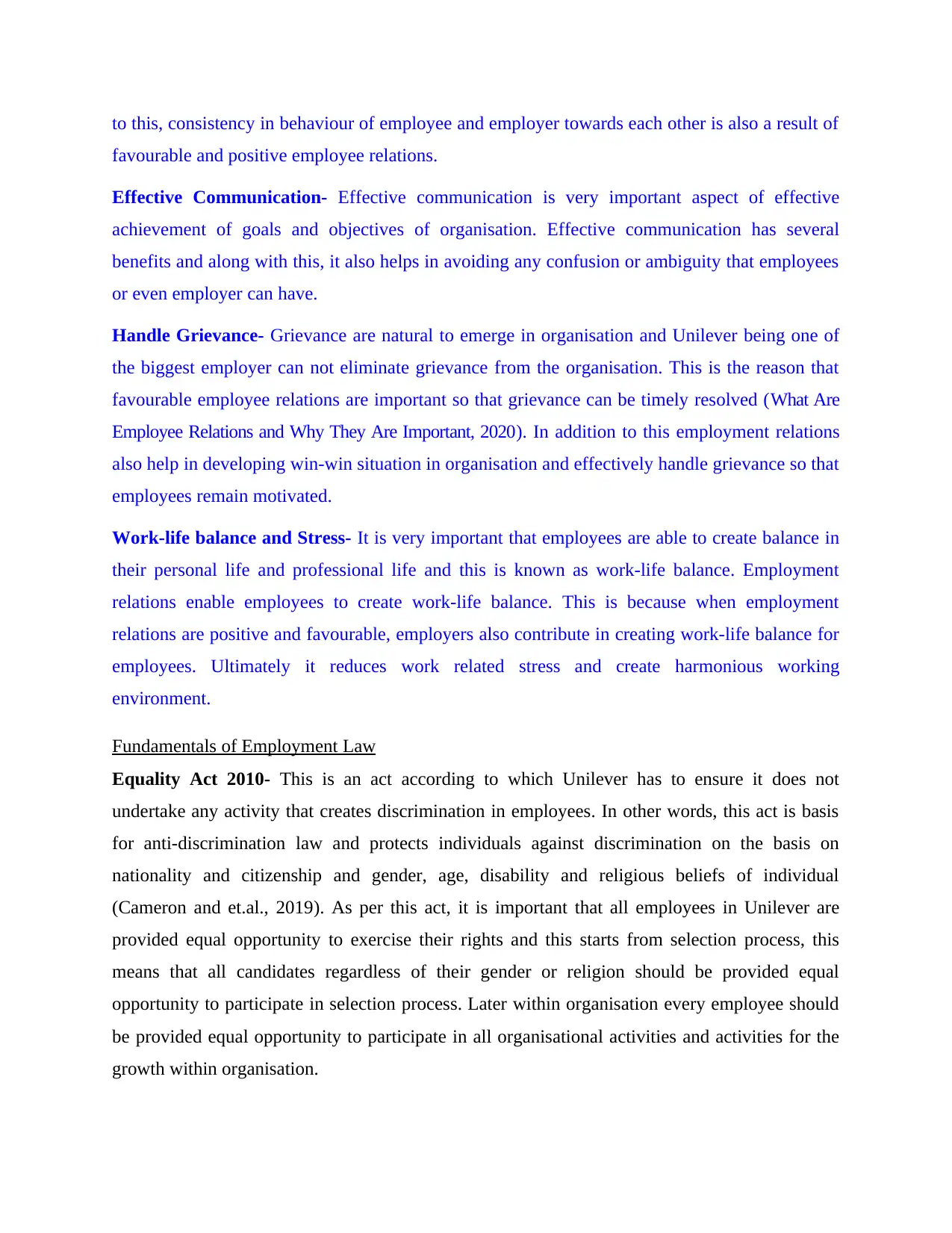
to this, consistency in behaviour of employee and employer towards each other is also a result of
favourable and positive employee relations.
Effective Communication- Effective communication is very important aspect of effective
achievement of goals and objectives of organisation. Effective communication has several
benefits and along with this, it also helps in avoiding any confusion or ambiguity that employees
or even employer can have.
Handle Grievance- Grievance are natural to emerge in organisation and Unilever being one of
the biggest employer can not eliminate grievance from the organisation. This is the reason that
favourable employee relations are important so that grievance can be timely resolved (What Are
Employee Relations and Why They Are Important, 2020). In addition to this employment relations
also help in developing win-win situation in organisation and effectively handle grievance so that
employees remain motivated.
Work-life balance and Stress- It is very important that employees are able to create balance in
their personal life and professional life and this is known as work-life balance. Employment
relations enable employees to create work-life balance. This is because when employment
relations are positive and favourable, employers also contribute in creating work-life balance for
employees. Ultimately it reduces work related stress and create harmonious working
environment.
Fundamentals of Employment Law
Equality Act 2010- This is an act according to which Unilever has to ensure it does not
undertake any activity that creates discrimination in employees. In other words, this act is basis
for anti-discrimination law and protects individuals against discrimination on the basis on
nationality and citizenship and gender, age, disability and religious beliefs of individual
(Cameron and et.al., 2019). As per this act, it is important that all employees in Unilever are
provided equal opportunity to exercise their rights and this starts from selection process, this
means that all candidates regardless of their gender or religion should be provided equal
opportunity to participate in selection process. Later within organisation every employee should
be provided equal opportunity to participate in all organisational activities and activities for the
growth within organisation.
favourable and positive employee relations.
Effective Communication- Effective communication is very important aspect of effective
achievement of goals and objectives of organisation. Effective communication has several
benefits and along with this, it also helps in avoiding any confusion or ambiguity that employees
or even employer can have.
Handle Grievance- Grievance are natural to emerge in organisation and Unilever being one of
the biggest employer can not eliminate grievance from the organisation. This is the reason that
favourable employee relations are important so that grievance can be timely resolved (What Are
Employee Relations and Why They Are Important, 2020). In addition to this employment relations
also help in developing win-win situation in organisation and effectively handle grievance so that
employees remain motivated.
Work-life balance and Stress- It is very important that employees are able to create balance in
their personal life and professional life and this is known as work-life balance. Employment
relations enable employees to create work-life balance. This is because when employment
relations are positive and favourable, employers also contribute in creating work-life balance for
employees. Ultimately it reduces work related stress and create harmonious working
environment.
Fundamentals of Employment Law
Equality Act 2010- This is an act according to which Unilever has to ensure it does not
undertake any activity that creates discrimination in employees. In other words, this act is basis
for anti-discrimination law and protects individuals against discrimination on the basis on
nationality and citizenship and gender, age, disability and religious beliefs of individual
(Cameron and et.al., 2019). As per this act, it is important that all employees in Unilever are
provided equal opportunity to exercise their rights and this starts from selection process, this
means that all candidates regardless of their gender or religion should be provided equal
opportunity to participate in selection process. Later within organisation every employee should
be provided equal opportunity to participate in all organisational activities and activities for the
growth within organisation.
Paraphrase This Document
Need a fresh take? Get an instant paraphrase of this document with our AI Paraphraser
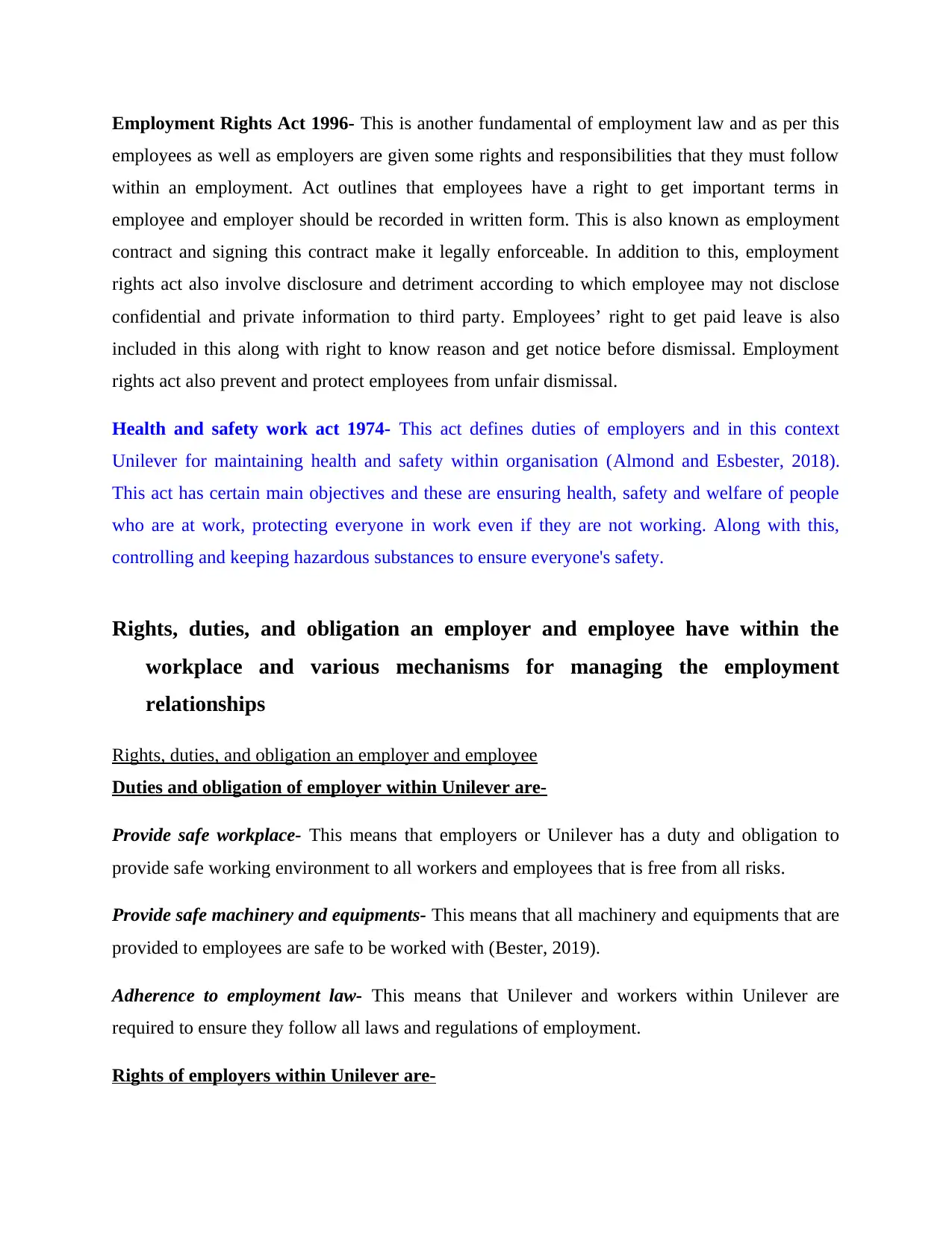
Employment Rights Act 1996- This is another fundamental of employment law and as per this
employees as well as employers are given some rights and responsibilities that they must follow
within an employment. Act outlines that employees have a right to get important terms in
employee and employer should be recorded in written form. This is also known as employment
contract and signing this contract make it legally enforceable. In addition to this, employment
rights act also involve disclosure and detriment according to which employee may not disclose
confidential and private information to third party. Employees’ right to get paid leave is also
included in this along with right to know reason and get notice before dismissal. Employment
rights act also prevent and protect employees from unfair dismissal.
Health and safety work act 1974- This act defines duties of employers and in this context
Unilever for maintaining health and safety within organisation (Almond and Esbester, 2018).
This act has certain main objectives and these are ensuring health, safety and welfare of people
who are at work, protecting everyone in work even if they are not working. Along with this,
controlling and keeping hazardous substances to ensure everyone's safety.
Rights, duties, and obligation an employer and employee have within the
workplace and various mechanisms for managing the employment
relationships
Rights, duties, and obligation an employer and employee
Duties and obligation of employer within Unilever are-
Provide safe workplace- This means that employers or Unilever has a duty and obligation to
provide safe working environment to all workers and employees that is free from all risks.
Provide safe machinery and equipments- This means that all machinery and equipments that are
provided to employees are safe to be worked with (Bester, 2019).
Adherence to employment law- This means that Unilever and workers within Unilever are
required to ensure they follow all laws and regulations of employment.
Rights of employers within Unilever are-
employees as well as employers are given some rights and responsibilities that they must follow
within an employment. Act outlines that employees have a right to get important terms in
employee and employer should be recorded in written form. This is also known as employment
contract and signing this contract make it legally enforceable. In addition to this, employment
rights act also involve disclosure and detriment according to which employee may not disclose
confidential and private information to third party. Employees’ right to get paid leave is also
included in this along with right to know reason and get notice before dismissal. Employment
rights act also prevent and protect employees from unfair dismissal.
Health and safety work act 1974- This act defines duties of employers and in this context
Unilever for maintaining health and safety within organisation (Almond and Esbester, 2018).
This act has certain main objectives and these are ensuring health, safety and welfare of people
who are at work, protecting everyone in work even if they are not working. Along with this,
controlling and keeping hazardous substances to ensure everyone's safety.
Rights, duties, and obligation an employer and employee have within the
workplace and various mechanisms for managing the employment
relationships
Rights, duties, and obligation an employer and employee
Duties and obligation of employer within Unilever are-
Provide safe workplace- This means that employers or Unilever has a duty and obligation to
provide safe working environment to all workers and employees that is free from all risks.
Provide safe machinery and equipments- This means that all machinery and equipments that are
provided to employees are safe to be worked with (Bester, 2019).
Adherence to employment law- This means that Unilever and workers within Unilever are
required to ensure they follow all laws and regulations of employment.
Rights of employers within Unilever are-
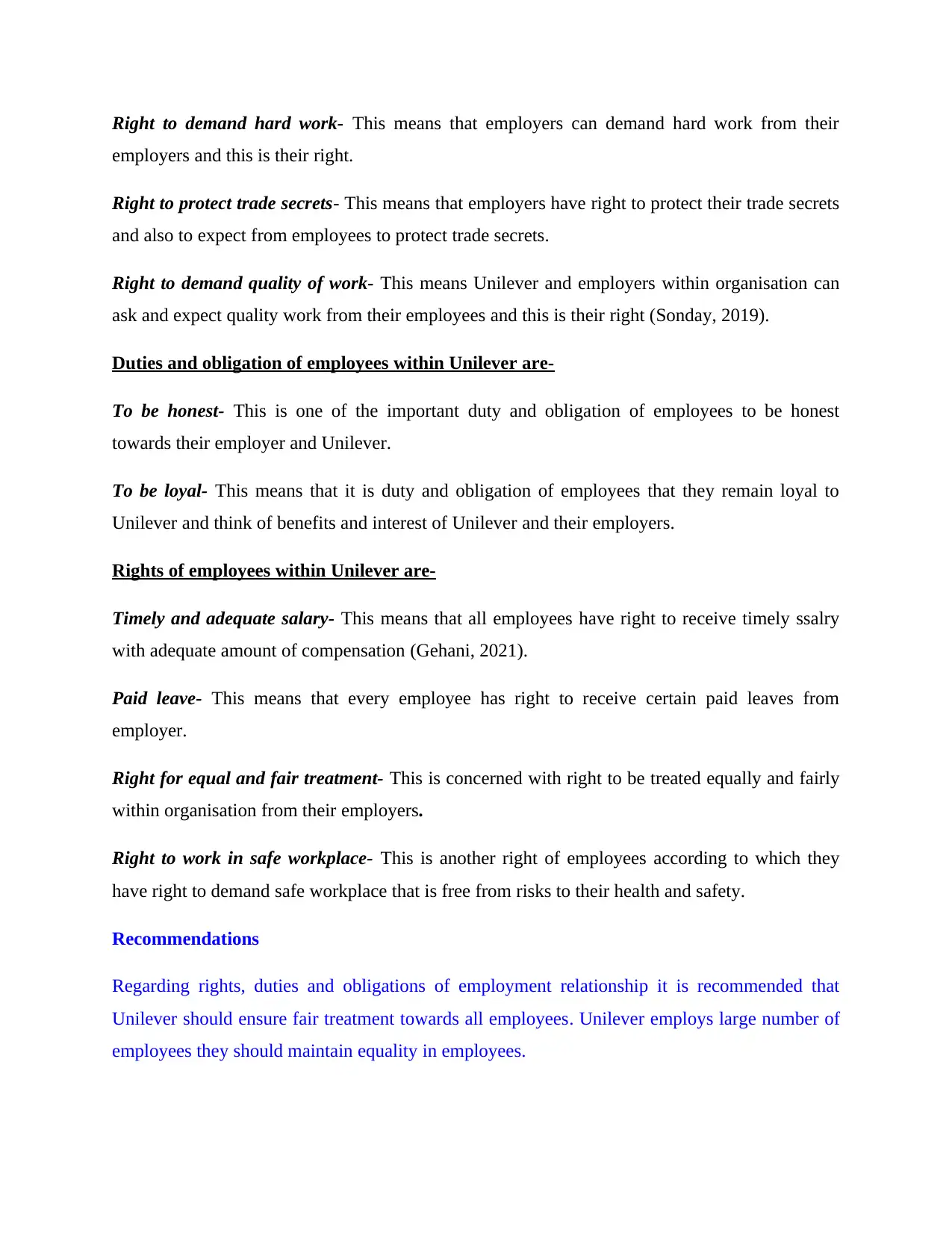
Right to demand hard work- This means that employers can demand hard work from their
employers and this is their right.
Right to protect trade secrets- This means that employers have right to protect their trade secrets
and also to expect from employees to protect trade secrets.
Right to demand quality of work- This means Unilever and employers within organisation can
ask and expect quality work from their employees and this is their right (Sonday, 2019).
Duties and obligation of employees within Unilever are-
To be honest- This is one of the important duty and obligation of employees to be honest
towards their employer and Unilever.
To be loyal- This means that it is duty and obligation of employees that they remain loyal to
Unilever and think of benefits and interest of Unilever and their employers.
Rights of employees within Unilever are-
Timely and adequate salary- This means that all employees have right to receive timely ssalry
with adequate amount of compensation (Gehani, 2021).
Paid leave- This means that every employee has right to receive certain paid leaves from
employer.
Right for equal and fair treatment- This is concerned with right to be treated equally and fairly
within organisation from their employers.
Right to work in safe workplace- This is another right of employees according to which they
have right to demand safe workplace that is free from risks to their health and safety.
Recommendations
Regarding rights, duties and obligations of employment relationship it is recommended that
Unilever should ensure fair treatment towards all employees. Unilever employs large number of
employees they should maintain equality in employees.
employers and this is their right.
Right to protect trade secrets- This means that employers have right to protect their trade secrets
and also to expect from employees to protect trade secrets.
Right to demand quality of work- This means Unilever and employers within organisation can
ask and expect quality work from their employees and this is their right (Sonday, 2019).
Duties and obligation of employees within Unilever are-
To be honest- This is one of the important duty and obligation of employees to be honest
towards their employer and Unilever.
To be loyal- This means that it is duty and obligation of employees that they remain loyal to
Unilever and think of benefits and interest of Unilever and their employers.
Rights of employees within Unilever are-
Timely and adequate salary- This means that all employees have right to receive timely ssalry
with adequate amount of compensation (Gehani, 2021).
Paid leave- This means that every employee has right to receive certain paid leaves from
employer.
Right for equal and fair treatment- This is concerned with right to be treated equally and fairly
within organisation from their employers.
Right to work in safe workplace- This is another right of employees according to which they
have right to demand safe workplace that is free from risks to their health and safety.
Recommendations
Regarding rights, duties and obligations of employment relationship it is recommended that
Unilever should ensure fair treatment towards all employees. Unilever employs large number of
employees they should maintain equality in employees.
⊘ This is a preview!⊘
Do you want full access?
Subscribe today to unlock all pages.

Trusted by 1+ million students worldwide
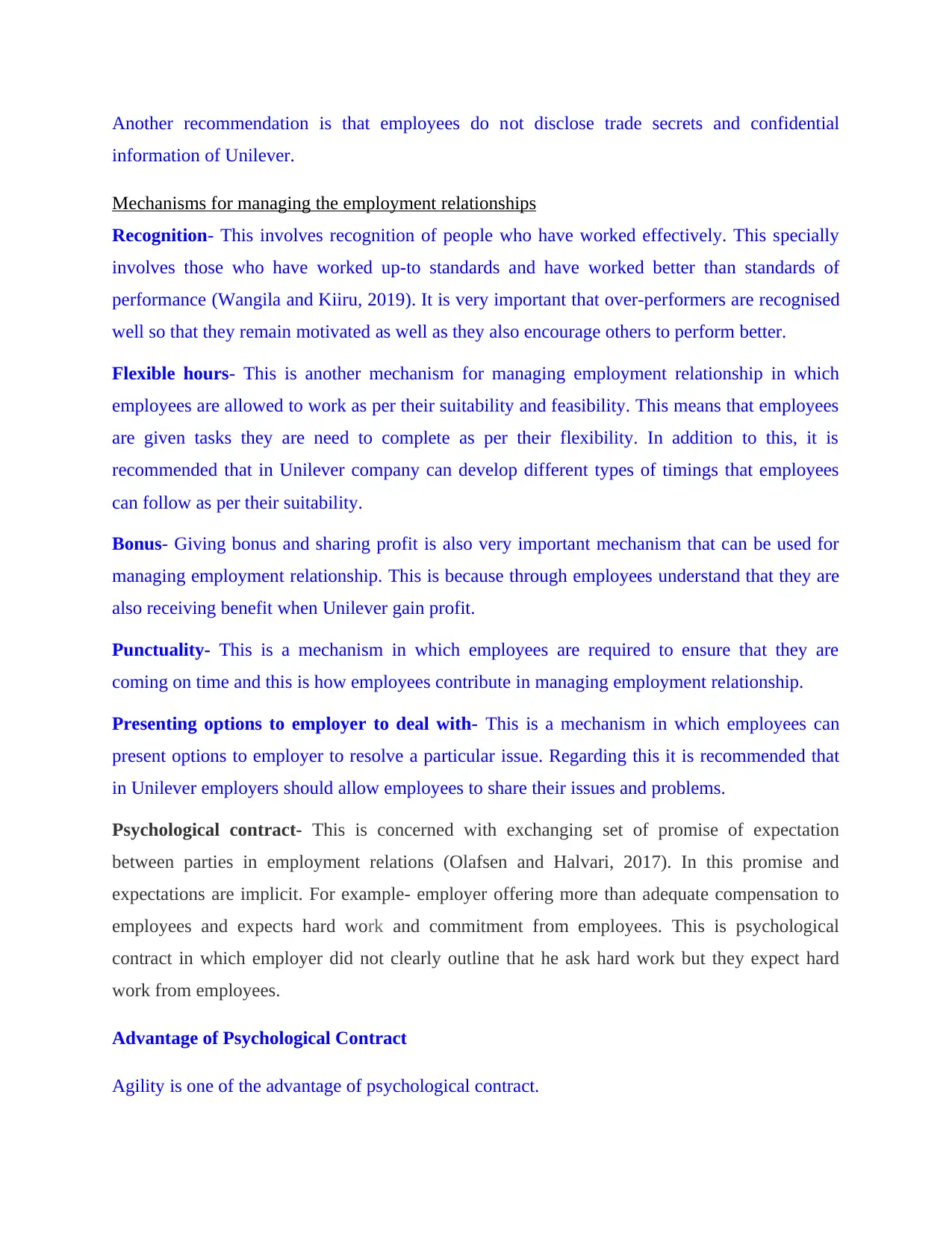
Another recommendation is that employees do not disclose trade secrets and confidential
information of Unilever.
Mechanisms for managing the employment relationships
Recognition- This involves recognition of people who have worked effectively. This specially
involves those who have worked up-to standards and have worked better than standards of
performance (Wangila and Kiiru, 2019). It is very important that over-performers are recognised
well so that they remain motivated as well as they also encourage others to perform better.
Flexible hours- This is another mechanism for managing employment relationship in which
employees are allowed to work as per their suitability and feasibility. This means that employees
are given tasks they are need to complete as per their flexibility. In addition to this, it is
recommended that in Unilever company can develop different types of timings that employees
can follow as per their suitability.
Bonus- Giving bonus and sharing profit is also very important mechanism that can be used for
managing employment relationship. This is because through employees understand that they are
also receiving benefit when Unilever gain profit.
Punctuality- This is a mechanism in which employees are required to ensure that they are
coming on time and this is how employees contribute in managing employment relationship.
Presenting options to employer to deal with- This is a mechanism in which employees can
present options to employer to resolve a particular issue. Regarding this it is recommended that
in Unilever employers should allow employees to share their issues and problems.
Psychological contract- This is concerned with exchanging set of promise of expectation
between parties in employment relations (Olafsen and Halvari, 2017). In this promise and
expectations are implicit. For example- employer offering more than adequate compensation to
employees and expects hard work and commitment from employees. This is psychological
contract in which employer did not clearly outline that he ask hard work but they expect hard
work from employees.
Advantage of Psychological Contract
Agility is one of the advantage of psychological contract.
information of Unilever.
Mechanisms for managing the employment relationships
Recognition- This involves recognition of people who have worked effectively. This specially
involves those who have worked up-to standards and have worked better than standards of
performance (Wangila and Kiiru, 2019). It is very important that over-performers are recognised
well so that they remain motivated as well as they also encourage others to perform better.
Flexible hours- This is another mechanism for managing employment relationship in which
employees are allowed to work as per their suitability and feasibility. This means that employees
are given tasks they are need to complete as per their flexibility. In addition to this, it is
recommended that in Unilever company can develop different types of timings that employees
can follow as per their suitability.
Bonus- Giving bonus and sharing profit is also very important mechanism that can be used for
managing employment relationship. This is because through employees understand that they are
also receiving benefit when Unilever gain profit.
Punctuality- This is a mechanism in which employees are required to ensure that they are
coming on time and this is how employees contribute in managing employment relationship.
Presenting options to employer to deal with- This is a mechanism in which employees can
present options to employer to resolve a particular issue. Regarding this it is recommended that
in Unilever employers should allow employees to share their issues and problems.
Psychological contract- This is concerned with exchanging set of promise of expectation
between parties in employment relations (Olafsen and Halvari, 2017). In this promise and
expectations are implicit. For example- employer offering more than adequate compensation to
employees and expects hard work and commitment from employees. This is psychological
contract in which employer did not clearly outline that he ask hard work but they expect hard
work from employees.
Advantage of Psychological Contract
Agility is one of the advantage of psychological contract.
Paraphrase This Document
Need a fresh take? Get an instant paraphrase of this document with our AI Paraphraser
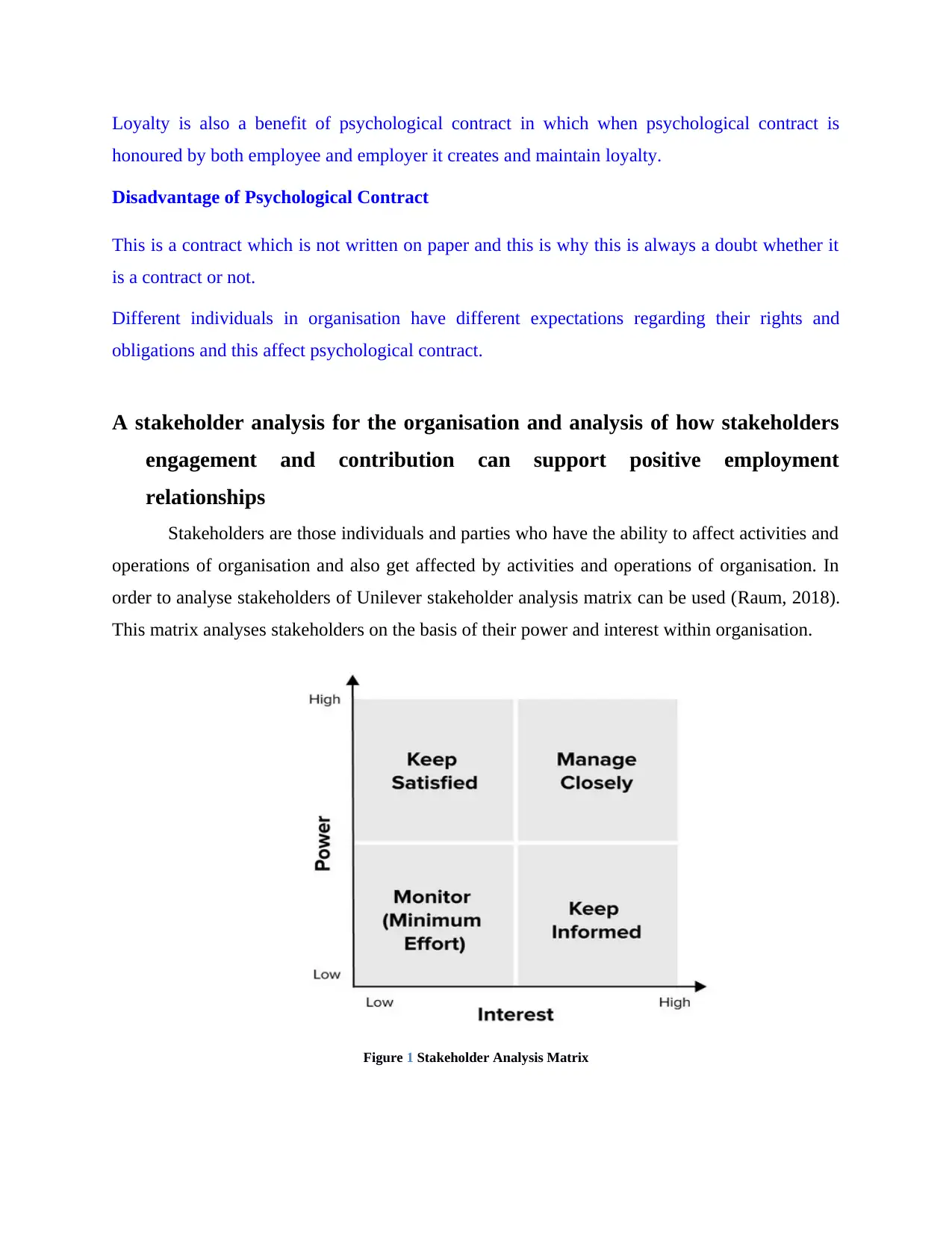
Loyalty is also a benefit of psychological contract in which when psychological contract is
honoured by both employee and employer it creates and maintain loyalty.
Disadvantage of Psychological Contract
This is a contract which is not written on paper and this is why this is always a doubt whether it
is a contract or not.
Different individuals in organisation have different expectations regarding their rights and
obligations and this affect psychological contract.
A stakeholder analysis for the organisation and analysis of how stakeholders
engagement and contribution can support positive employment
relationships
Stakeholders are those individuals and parties who have the ability to affect activities and
operations of organisation and also get affected by activities and operations of organisation. In
order to analyse stakeholders of Unilever stakeholder analysis matrix can be used (Raum, 2018).
This matrix analyses stakeholders on the basis of their power and interest within organisation.
Figure 1 Stakeholder Analysis Matrix
honoured by both employee and employer it creates and maintain loyalty.
Disadvantage of Psychological Contract
This is a contract which is not written on paper and this is why this is always a doubt whether it
is a contract or not.
Different individuals in organisation have different expectations regarding their rights and
obligations and this affect psychological contract.
A stakeholder analysis for the organisation and analysis of how stakeholders
engagement and contribution can support positive employment
relationships
Stakeholders are those individuals and parties who have the ability to affect activities and
operations of organisation and also get affected by activities and operations of organisation. In
order to analyse stakeholders of Unilever stakeholder analysis matrix can be used (Raum, 2018).
This matrix analyses stakeholders on the basis of their power and interest within organisation.
Figure 1 Stakeholder Analysis Matrix
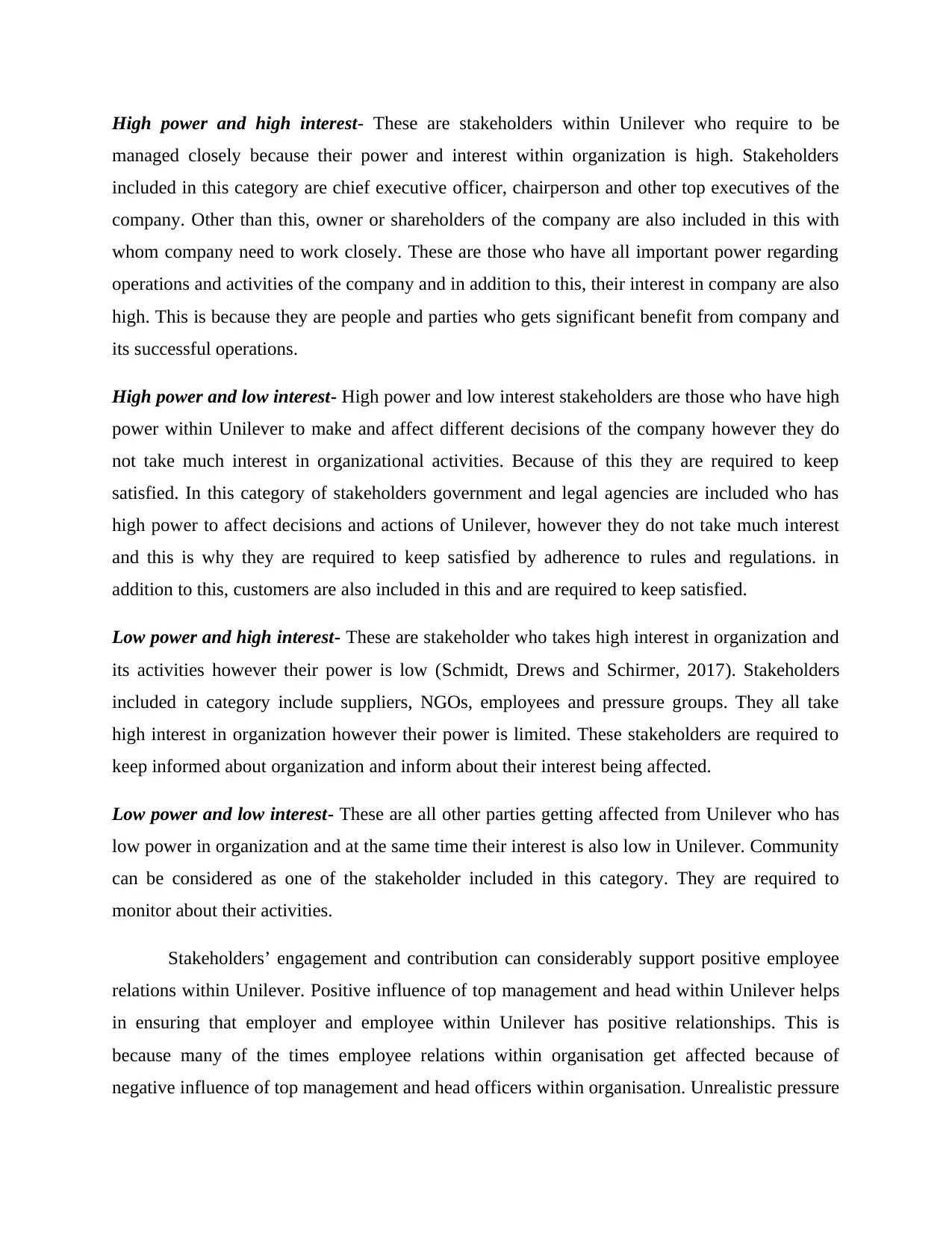
High power and high interest- These are stakeholders within Unilever who require to be
managed closely because their power and interest within organization is high. Stakeholders
included in this category are chief executive officer, chairperson and other top executives of the
company. Other than this, owner or shareholders of the company are also included in this with
whom company need to work closely. These are those who have all important power regarding
operations and activities of the company and in addition to this, their interest in company are also
high. This is because they are people and parties who gets significant benefit from company and
its successful operations.
High power and low interest- High power and low interest stakeholders are those who have high
power within Unilever to make and affect different decisions of the company however they do
not take much interest in organizational activities. Because of this they are required to keep
satisfied. In this category of stakeholders government and legal agencies are included who has
high power to affect decisions and actions of Unilever, however they do not take much interest
and this is why they are required to keep satisfied by adherence to rules and regulations. in
addition to this, customers are also included in this and are required to keep satisfied.
Low power and high interest- These are stakeholder who takes high interest in organization and
its activities however their power is low (Schmidt, Drews and Schirmer, 2017). Stakeholders
included in category include suppliers, NGOs, employees and pressure groups. They all take
high interest in organization however their power is limited. These stakeholders are required to
keep informed about organization and inform about their interest being affected.
Low power and low interest- These are all other parties getting affected from Unilever who has
low power in organization and at the same time their interest is also low in Unilever. Community
can be considered as one of the stakeholder included in this category. They are required to
monitor about their activities.
Stakeholders’ engagement and contribution can considerably support positive employee
relations within Unilever. Positive influence of top management and head within Unilever helps
in ensuring that employer and employee within Unilever has positive relationships. This is
because many of the times employee relations within organisation get affected because of
negative influence of top management and head officers within organisation. Unrealistic pressure
managed closely because their power and interest within organization is high. Stakeholders
included in this category are chief executive officer, chairperson and other top executives of the
company. Other than this, owner or shareholders of the company are also included in this with
whom company need to work closely. These are those who have all important power regarding
operations and activities of the company and in addition to this, their interest in company are also
high. This is because they are people and parties who gets significant benefit from company and
its successful operations.
High power and low interest- High power and low interest stakeholders are those who have high
power within Unilever to make and affect different decisions of the company however they do
not take much interest in organizational activities. Because of this they are required to keep
satisfied. In this category of stakeholders government and legal agencies are included who has
high power to affect decisions and actions of Unilever, however they do not take much interest
and this is why they are required to keep satisfied by adherence to rules and regulations. in
addition to this, customers are also included in this and are required to keep satisfied.
Low power and high interest- These are stakeholder who takes high interest in organization and
its activities however their power is low (Schmidt, Drews and Schirmer, 2017). Stakeholders
included in category include suppliers, NGOs, employees and pressure groups. They all take
high interest in organization however their power is limited. These stakeholders are required to
keep informed about organization and inform about their interest being affected.
Low power and low interest- These are all other parties getting affected from Unilever who has
low power in organization and at the same time their interest is also low in Unilever. Community
can be considered as one of the stakeholder included in this category. They are required to
monitor about their activities.
Stakeholders’ engagement and contribution can considerably support positive employee
relations within Unilever. Positive influence of top management and head within Unilever helps
in ensuring that employer and employee within Unilever has positive relationships. This is
because many of the times employee relations within organisation get affected because of
negative influence of top management and head officers within organisation. Unrealistic pressure
⊘ This is a preview!⊘
Do you want full access?
Subscribe today to unlock all pages.

Trusted by 1+ million students worldwide
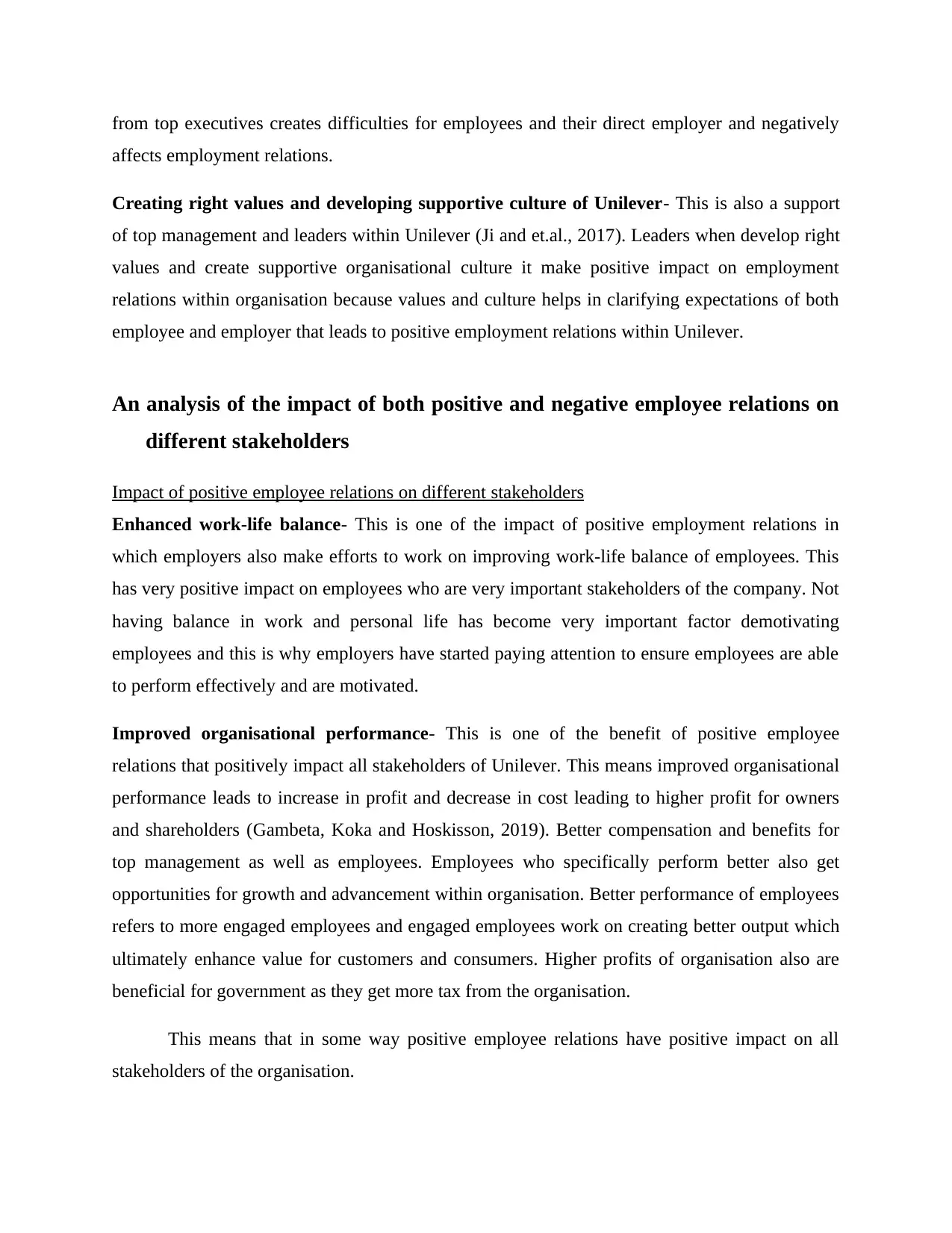
from top executives creates difficulties for employees and their direct employer and negatively
affects employment relations.
Creating right values and developing supportive culture of Unilever- This is also a support
of top management and leaders within Unilever (Ji and et.al., 2017). Leaders when develop right
values and create supportive organisational culture it make positive impact on employment
relations within organisation because values and culture helps in clarifying expectations of both
employee and employer that leads to positive employment relations within Unilever.
An analysis of the impact of both positive and negative employee relations on
different stakeholders
Impact of positive employee relations on different stakeholders
Enhanced work-life balance- This is one of the impact of positive employment relations in
which employers also make efforts to work on improving work-life balance of employees. This
has very positive impact on employees who are very important stakeholders of the company. Not
having balance in work and personal life has become very important factor demotivating
employees and this is why employers have started paying attention to ensure employees are able
to perform effectively and are motivated.
Improved organisational performance- This is one of the benefit of positive employee
relations that positively impact all stakeholders of Unilever. This means improved organisational
performance leads to increase in profit and decrease in cost leading to higher profit for owners
and shareholders (Gambeta, Koka and Hoskisson, 2019). Better compensation and benefits for
top management as well as employees. Employees who specifically perform better also get
opportunities for growth and advancement within organisation. Better performance of employees
refers to more engaged employees and engaged employees work on creating better output which
ultimately enhance value for customers and consumers. Higher profits of organisation also are
beneficial for government as they get more tax from the organisation.
This means that in some way positive employee relations have positive impact on all
stakeholders of the organisation.
affects employment relations.
Creating right values and developing supportive culture of Unilever- This is also a support
of top management and leaders within Unilever (Ji and et.al., 2017). Leaders when develop right
values and create supportive organisational culture it make positive impact on employment
relations within organisation because values and culture helps in clarifying expectations of both
employee and employer that leads to positive employment relations within Unilever.
An analysis of the impact of both positive and negative employee relations on
different stakeholders
Impact of positive employee relations on different stakeholders
Enhanced work-life balance- This is one of the impact of positive employment relations in
which employers also make efforts to work on improving work-life balance of employees. This
has very positive impact on employees who are very important stakeholders of the company. Not
having balance in work and personal life has become very important factor demotivating
employees and this is why employers have started paying attention to ensure employees are able
to perform effectively and are motivated.
Improved organisational performance- This is one of the benefit of positive employee
relations that positively impact all stakeholders of Unilever. This means improved organisational
performance leads to increase in profit and decrease in cost leading to higher profit for owners
and shareholders (Gambeta, Koka and Hoskisson, 2019). Better compensation and benefits for
top management as well as employees. Employees who specifically perform better also get
opportunities for growth and advancement within organisation. Better performance of employees
refers to more engaged employees and engaged employees work on creating better output which
ultimately enhance value for customers and consumers. Higher profits of organisation also are
beneficial for government as they get more tax from the organisation.
This means that in some way positive employee relations have positive impact on all
stakeholders of the organisation.
Paraphrase This Document
Need a fresh take? Get an instant paraphrase of this document with our AI Paraphraser
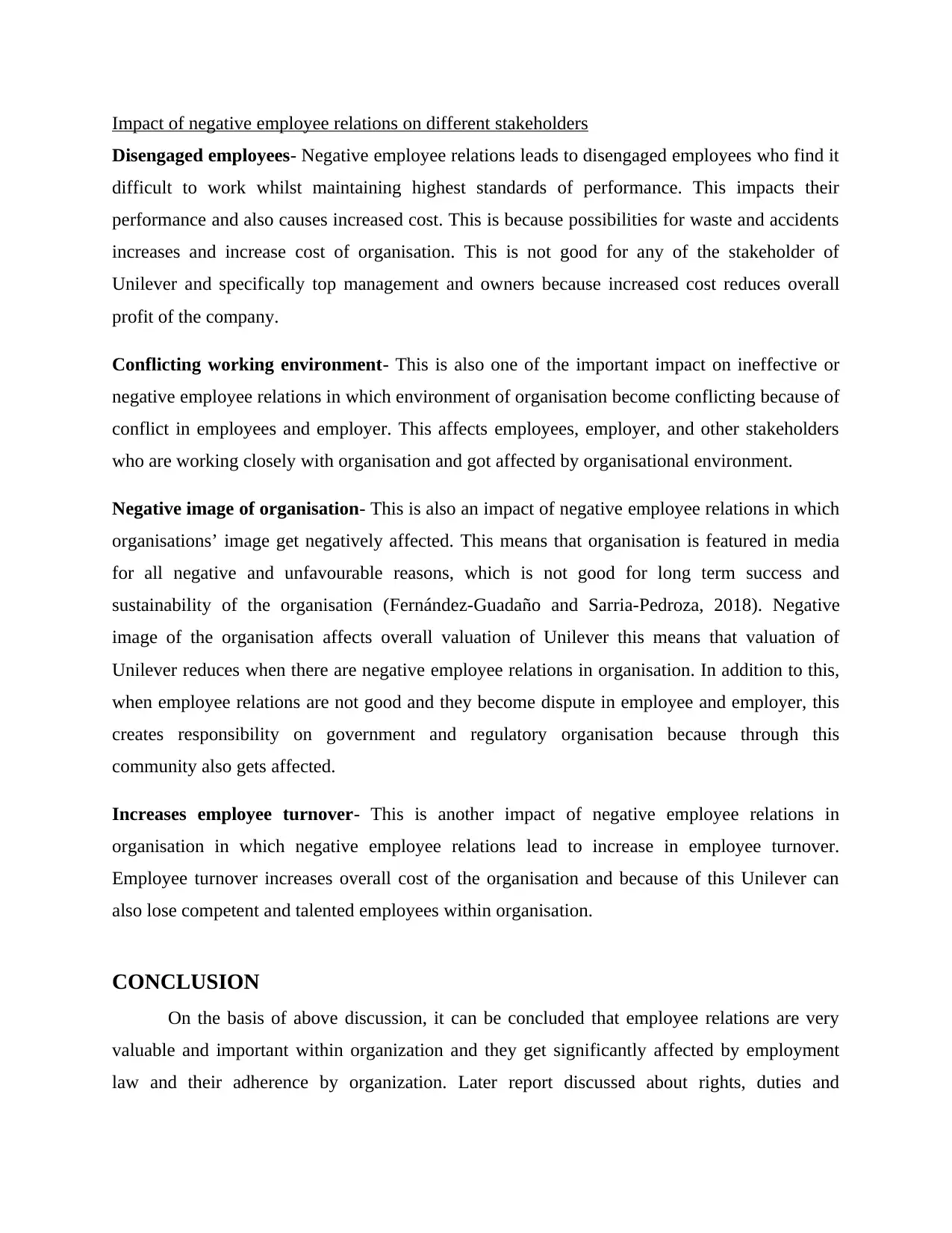
Impact of negative employee relations on different stakeholders
Disengaged employees- Negative employee relations leads to disengaged employees who find it
difficult to work whilst maintaining highest standards of performance. This impacts their
performance and also causes increased cost. This is because possibilities for waste and accidents
increases and increase cost of organisation. This is not good for any of the stakeholder of
Unilever and specifically top management and owners because increased cost reduces overall
profit of the company.
Conflicting working environment- This is also one of the important impact on ineffective or
negative employee relations in which environment of organisation become conflicting because of
conflict in employees and employer. This affects employees, employer, and other stakeholders
who are working closely with organisation and got affected by organisational environment.
Negative image of organisation- This is also an impact of negative employee relations in which
organisations’ image get negatively affected. This means that organisation is featured in media
for all negative and unfavourable reasons, which is not good for long term success and
sustainability of the organisation (Fernández-Guadaño and Sarria-Pedroza, 2018). Negative
image of the organisation affects overall valuation of Unilever this means that valuation of
Unilever reduces when there are negative employee relations in organisation. In addition to this,
when employee relations are not good and they become dispute in employee and employer, this
creates responsibility on government and regulatory organisation because through this
community also gets affected.
Increases employee turnover- This is another impact of negative employee relations in
organisation in which negative employee relations lead to increase in employee turnover.
Employee turnover increases overall cost of the organisation and because of this Unilever can
also lose competent and talented employees within organisation.
CONCLUSION
On the basis of above discussion, it can be concluded that employee relations are very
valuable and important within organization and they get significantly affected by employment
law and their adherence by organization. Later report discussed about rights, duties and
Disengaged employees- Negative employee relations leads to disengaged employees who find it
difficult to work whilst maintaining highest standards of performance. This impacts their
performance and also causes increased cost. This is because possibilities for waste and accidents
increases and increase cost of organisation. This is not good for any of the stakeholder of
Unilever and specifically top management and owners because increased cost reduces overall
profit of the company.
Conflicting working environment- This is also one of the important impact on ineffective or
negative employee relations in which environment of organisation become conflicting because of
conflict in employees and employer. This affects employees, employer, and other stakeholders
who are working closely with organisation and got affected by organisational environment.
Negative image of organisation- This is also an impact of negative employee relations in which
organisations’ image get negatively affected. This means that organisation is featured in media
for all negative and unfavourable reasons, which is not good for long term success and
sustainability of the organisation (Fernández-Guadaño and Sarria-Pedroza, 2018). Negative
image of the organisation affects overall valuation of Unilever this means that valuation of
Unilever reduces when there are negative employee relations in organisation. In addition to this,
when employee relations are not good and they become dispute in employee and employer, this
creates responsibility on government and regulatory organisation because through this
community also gets affected.
Increases employee turnover- This is another impact of negative employee relations in
organisation in which negative employee relations lead to increase in employee turnover.
Employee turnover increases overall cost of the organisation and because of this Unilever can
also lose competent and talented employees within organisation.
CONCLUSION
On the basis of above discussion, it can be concluded that employee relations are very
valuable and important within organization and they get significantly affected by employment
law and their adherence by organization. Later report discussed about rights, duties and
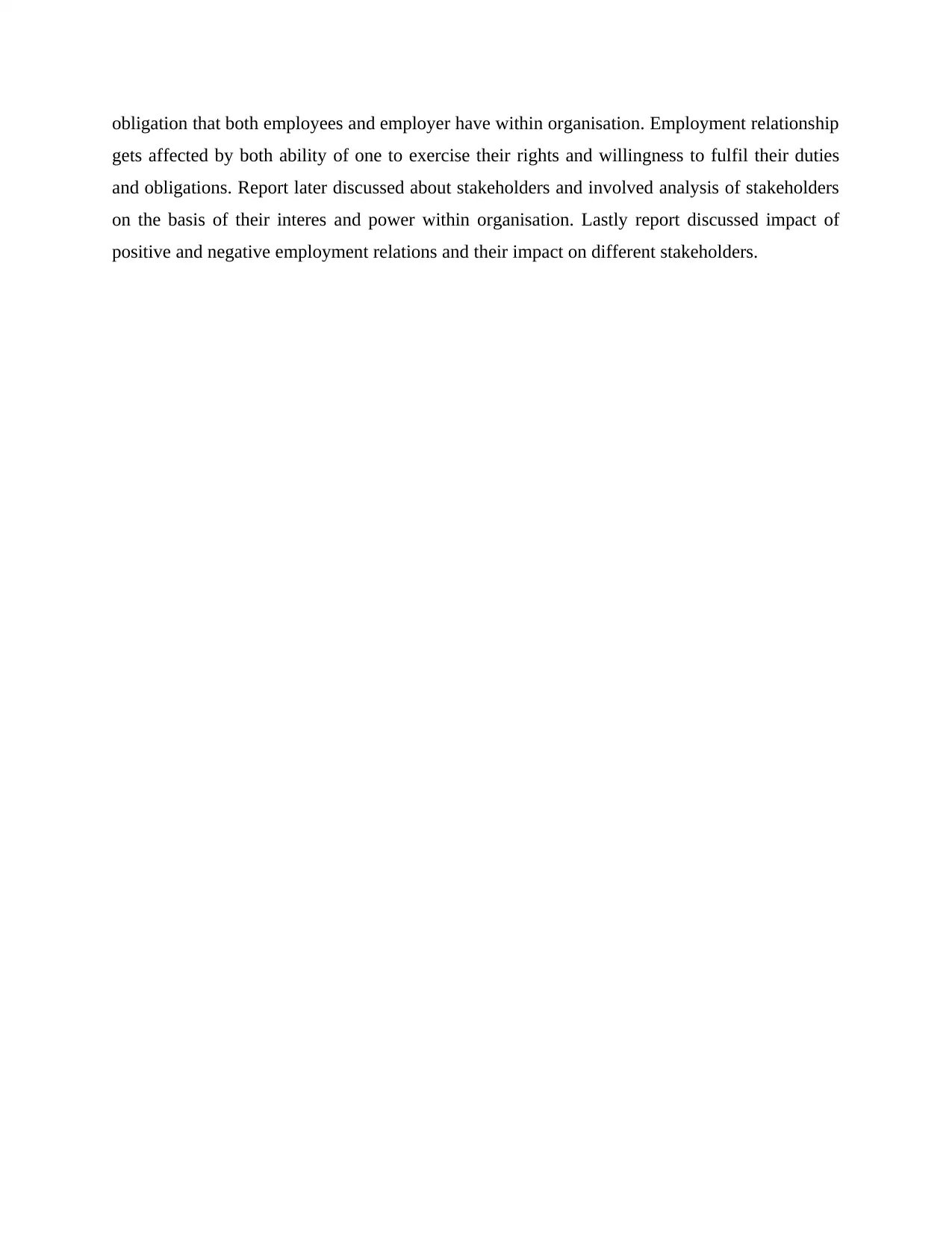
obligation that both employees and employer have within organisation. Employment relationship
gets affected by both ability of one to exercise their rights and willingness to fulfil their duties
and obligations. Report later discussed about stakeholders and involved analysis of stakeholders
on the basis of their interes and power within organisation. Lastly report discussed impact of
positive and negative employment relations and their impact on different stakeholders.
gets affected by both ability of one to exercise their rights and willingness to fulfil their duties
and obligations. Report later discussed about stakeholders and involved analysis of stakeholders
on the basis of their interes and power within organisation. Lastly report discussed impact of
positive and negative employment relations and their impact on different stakeholders.
⊘ This is a preview!⊘
Do you want full access?
Subscribe today to unlock all pages.

Trusted by 1+ million students worldwide
1 out of 14
Related Documents
Your All-in-One AI-Powered Toolkit for Academic Success.
+13062052269
info@desklib.com
Available 24*7 on WhatsApp / Email
![[object Object]](/_next/static/media/star-bottom.7253800d.svg)
Unlock your academic potential
Copyright © 2020–2026 A2Z Services. All Rights Reserved. Developed and managed by ZUCOL.



